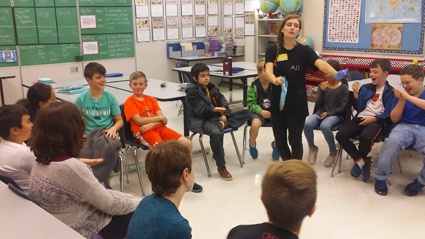MINDFULNESS
For Schools

Mindfulness in Schools for Clarity, Calm, and Connection
InSchools MindEd for K-12 professionals
InSchools MindEd for K-12 professionals delivers in-depth mindfulness training to faculty and staff in public schools. We have been delivering our InSchools mindfulness training program to school divisions in this region since 2017, both in-person and virtually.
Why Mindfulness in Schools?
Mindfulness training has been shown to address several issues facing public education today, including:
We have also observed the following results from the InSchools program:
Retired superintendent and past program participant, Dr. Mark Church, shared:
“I joined our teachers in completing the training myself in 2018, and found that it enhanced my ability to manage difficult situations and relationships effectively and compassionately. This program provides participating teachers, administrators, and staff with greater calm and resilience, and delivers tools for us to incorporate mindfulness practices into our own lives. The teachers have been able to apply what they’ve learned in their classrooms and in our schools, directly benefiting students, colleagues, and families.”
Testimonials
“This was the most valuable program I have ever participated in.”
“Peers are noticing the benefits.”
“Thank you! You’ve helped me to change my life.”
“A breakthrough occurred in me while taking this course.”
“I tell everyone at school that this class is Amazing.”
“I would recommend it for everyone.”
“AMAZING! Insightful, excellent instructors.”
Some Past Participating Schools & Districts
How It Works
We offer up to 20 hours of InSchools programming, for up to 20 participants per cohort, to be completed during the first semester. The programming is divided into consecutive 10-hour Level I and Level II offerings. Past participants are invited to attend the Level II program, as well as anyone who completes Level I. Classes can be conducted live online or in-person. This is the format to expect in each level:
Completion of the program gives participants tools to increase wellbeing and reduce stress through mindfulness, and also provides them with techniques to introduce mindful practices into schools and classrooms, in what can become lasting and effective mindfulness-based interventions. Participants will also be provided with unlimited access to our InSchools Curriculum Guidebook.
In order to deliver this programming, InStill requires the school division to provide 10 Recertification Credits per level to each participant who completes the program, by attending the half-day retreat and at least four of the six one-hour classes. Any participants not completing the course will be able to carry their hours over to the next year’s program and/or make up hours by attending certain InStill offerings.
At least one administrator must also attend as a condition of us delivering this programming.
In recognition of different school divisions’ ability to fund such a program, we are offering sliding scale pricing of $1,750 to $2,750 for each level of the in-person program and $500 to $1,500 for each level of the online program. We are happy to discuss this in more detail with you at any time.








